Google has reported that 15% of searches they see every day are entirely new. This means that almost 15% of daily searches present untapped opportunities as they are emerging and have never been explored before.
In this guide, we’ll explore how you can take advantage of this, stay ahead of your competitors, and maximize your SEO efforts.
But before we dive into the best practices for finding untapped keywords, let’s briefly understand what they are and why they are crucial for your next SEO strategy.
Untapped keywords, also referred to as underserved keywords, are search terms that either have very low competition or are not yet widely targeted by competitors. These low-competition keywords are highly valuable because they provide easier opportunities to rank on search engine result pages (SERPs).
Untapped keywords are often emerging keywords—new or trending search queries that have minimal competition and low search volume initially but hold potential for future growth.
On the other hand, some underserved keywords already attract high traffic, but have yet to gain widespread recognition. Such keywords represent an untapped opportunity, as they are on the verge of becoming more competitive but are still relatively easy to rank for.
In short, underserved keywords may or may not have a high search volume, but one thing is certain: these keywords have low competition.
You might be wondering why these keywords matter to your business.
Imagine finding high-intent, low-competition keywords that can bring in qualified leads without stretching your budget—an ideal scenario for boosting your website’s visibility and conversions.
Now, let’s dive into the best strategies to uncover these low-hanging keywords and capitalize on their potential.
In the first step, we will see how to find underserved keywords, and the next step, we will discuss how to use different tools to get raw data.
On this page
Finding underserved (low competition) keywords from your list:
There are numerous free keyword research tools available to help you find opportunities. These tools can also predict whether a keyword has low competition, but that’s just the first step. Here’s the next step that will actually help you identify low-hanging fruit.
No matter which keyword research tool from the list below you use, once you have the keywords in hand, you can verify whether they are genuinely low competition and how many webmasters are targeting them.
In my experience, as you niche down and become more specific about your products and solutions, you will discover more and more underserved opportunities.
Here is how you analyze your keywords list to find low-hanging keywords.
- Search your keyword on Google.com
- Do you see all the exact match titles on the first page? I mean, it looks obvious that all the 10 pages are perfectly discussing the topic.
If so, it’s not underserved. Delete the keyword from your list. Otherwise, check the following things. - Check the website authority using tools like Semrush, Ahrefs, or Moz. If you find low-authority websites ranking for that keyword, it’s a signal that it’s a low-competition keyword.
- Now open the top 10 results and analyze them.
- How many of them are actually satisfying the query?
Many times, businesses discuss their solutions as the best, but that’s not the best approach to satisfy search intent. This indicates that the keyword has low competition, as there are not many high-quality pages, which is why such low-quality content is ranking at the top. This approach helped me rank for many keywords easily. - Lastly, use the search operator allintitle:keyword to see how many webmasters targeted that keyword in the primary titles. The lower, the better.
It may seem time-consuming, but it ultimately saves you time and money in the long run.
For instance, I used this strategy to identify several high-potential keywords, targeted them, and achieved rankings within just three months. Now, those pages drive qualified leads to my business.
I targeted the keyword “how to get clients for outsourcing business”. I analyzed it and found it a low competition.
As there are quite a few results when I used the search operator.
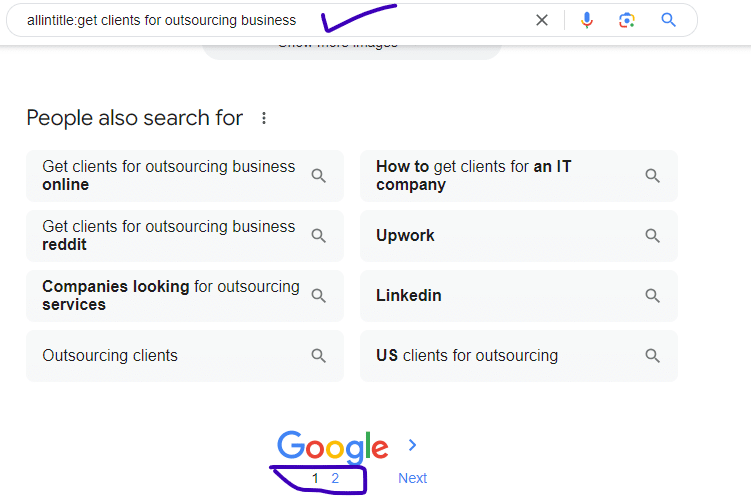
Now, if you analyze the results, you will see that most lead generation companies are presenting themselves as the best service providers for this keyword, but that content does not effectively satisfy search intent.
That’s why, when I provided an in-depth guide with 6 strategies, I was able to rank easily within three months without any extra effort.

Find Keywords with Google’s Keyword Planner:
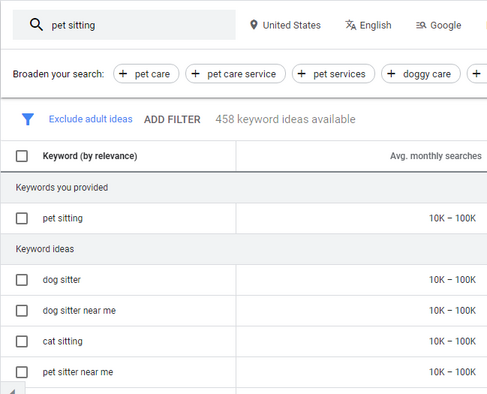
Google offers a fantastic keyword research tool for free. Most SEO tools extract data from Google Adwords. It provides fresh and highly useful information for finding low-competition opportunities.
Here is how to use this tool to find untapped keywords.
- Go to “Google Ads keyword planner“
- Sign in to your account.
- Click “Discover new keywords.”
- Enter your product or service’s name.
- Pick the suitable keywords for your services.
There are thousands of keywords out there, but not all of them are right for you. You need to choose the ones that you can effectively target to rank your business organically and drive inbound leads.
So, you should select keywords with low competition according to the keyword research tool.
If a keyword in the planner shows high competition, it means many people are bidding on that term, indicating its popularity. It also predicts that it can be hard to rank for this keyword.
Therefore, focus on keywords labeled as low-competition keywords. This approach will save you time and enhance your chances of ranking effectively.
Use Bing Keyword Research Tool:
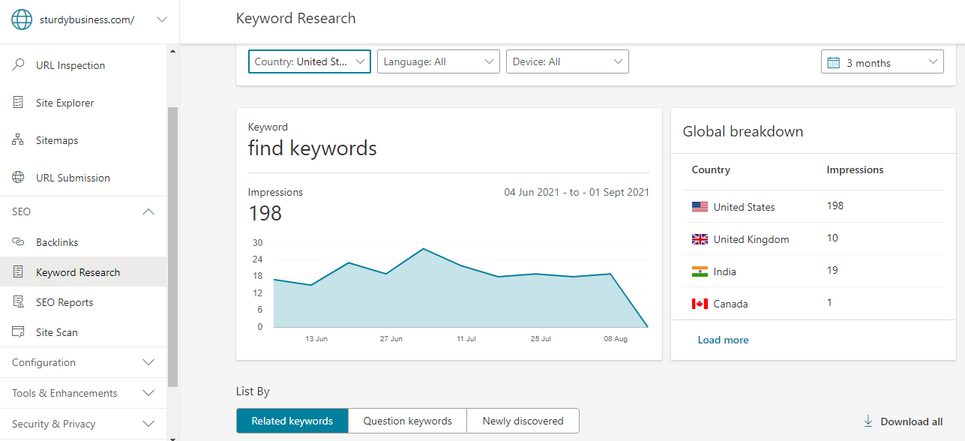
Bing also offers a free keyword research tool.
These keywords will be useful for Bing and other search engines because the problems in a specific area are similar for all customers. So, whether you use Google or Bing for keyword research, it will be effective.
One important consideration is that keywords you find for the USA might not work as well in the UK, especially long-tail keywords. Therefore, make sure to use your specific region or country to identify the best opportunities.
For instance, every country has different currencies, slang, jargon, etc. All of these factors matter greatly in helping search engines understand which country you are targeting. Thus, ensure you do this properly.
Here are a few easy steps to use the free tool.
- Click “Bing webmasters keyword research“.
- Sign in if not already.
- Put the main topic.
- Pick the right keywords.
Finding many queries in front of you won’t take more than a minute.
Use Keyword Surfer Extension:

Using multiple apps and tools for your SEO strategy provides you with more untapped opportunities. You’re more likely to discover queries that various apps and tools have gathered in their databases.
That’s why you should utilize several keyword research tools to identify the best opportunities. And the best part is that almost all the tools offer limited free versions.
Keyword Surfer is one of them. Keywords Everywhere is also a freemium app similar to Keyword Surfer. You can use any of these apps to enhance your keyword research efforts.
I use the keyword Surfer as an extension that tracks all my queries and gives me an idea of what relevant phrases (you can also use them as LSI keywords) people are searching for and how much volume those queries have.
It’s pretty easy.
- Type “Keyword Surfer” on Google or Click here to install the Chrome extension.
- Once installed, search for any query on Google.
- Get ideas relevant to that query in the “Surfer Box.”
Pick the best keywords following the same method mentioned above. (Search each keyword manually to check if it’s explored or not).
Find Low Competition Keywords With Ahrefs And Semrush:
Ahrefs and Semrush are two of the finest tools that can help you find low-competition keywords.
These tools come with additional benefits that you might not find in Google or Bing keyword planners. Since they are specialized SEO tools, they have extensive data about search engine results pages (SERP) and use this data to rank keywords.
For instance, if the websites on the SERP are not authoritative or lack sufficient page-level backlinks for any search terms, they mark those keywords and phrases as low-hanging fruit.
For instance, take a look at this: Ahrefs marks “laundry business” and “how to start a laundry business” as easy, giving them a green signal.
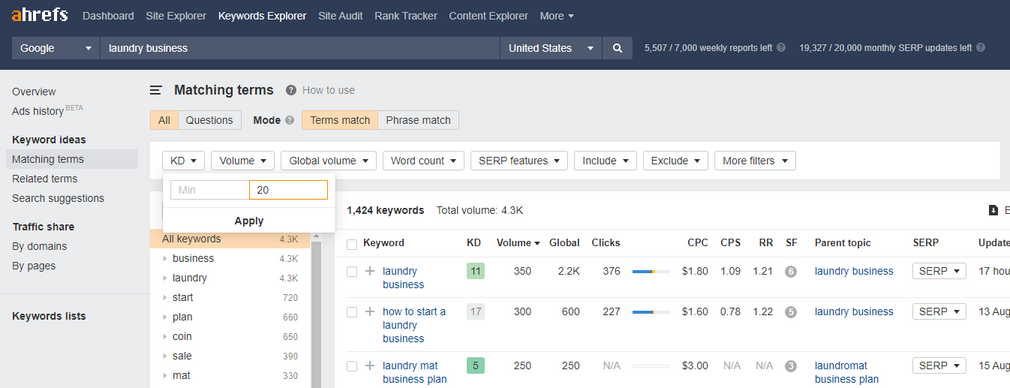
Similarly, Semrush marks “offshore software development company” and “offshore software development services” as an easy one to target.
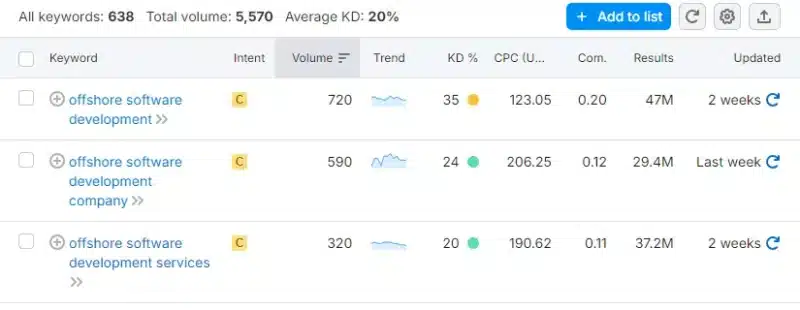
So, if you were wondering whether to use premium tools like Ahrefs and Semrush for your keyword research, I would say yes, as they make your research easier and save you valuable time.
Even if you use these premium tools, you will still apply the same strategy we discussed earlier to find underserved keywords. These tools simply save you time by providing more accurate data, which you can manually check and analyze.
When building a blog strategy, you can utilize all the keywords labeled as low competition because, in the long run, you need to focus on all the available opportunities to generate business.
Storybase: Another Excellent Keyword Research Partner
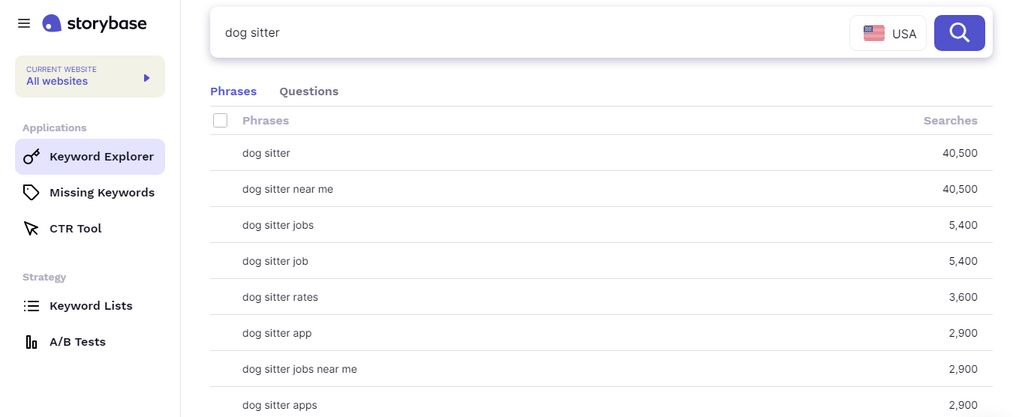
Storybase is one of my favorite keyword research tools. It’s also easy to use.
- Go to storybase.com
- Click “Keyword Explorer.”
- Type your main topic; let’s say it’s “Dogsitter.”
- Pick the right queries for your business (or blog).
Just like Ahref, StoryBase also has an excellent database. It’s worth investing in.
Use ‘Google Search’ to Discover New Keywords for Free:
Google Search is another great tool to find new keywords for free. Just start typing a relevant phrase, and Google will automatically suggest keywords based on real user queries.
These suggestions are often long-tail keywords and sometimes untapped opportunities that you can target.
By simply using Google Autocomplete, if you go through all the suggested keywords, you can uncover popular search terms related to your niche, and because these are suggested by Google, they reflect what people are actually searching for.
Let’s say you’re a lead generation services provider, here is how to find opportunities with Google search.
- Type your primary keyword ‘lead generation’ and then add any alphabet
- Try different alphabets and you will many opportunities with Google Autosuggest
For instance, when I kept typing I found that the real estate industry in the USA is looking for lead generation services.
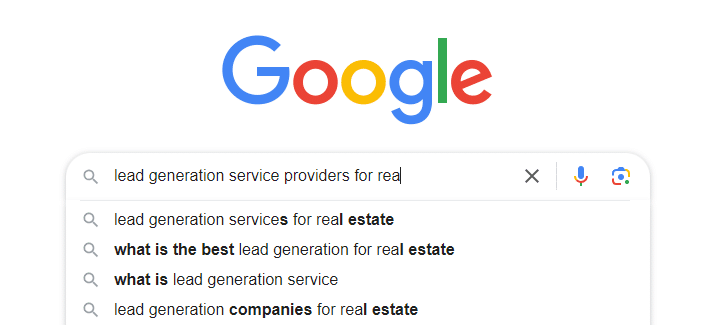
If you keep trying, you will soon realize which keywords don’t have good results based on intent and you can target them.
The other ones appear as People Also Ask for. Here is what I found when I searched the keyword ‘lead generation service providers for real estate’
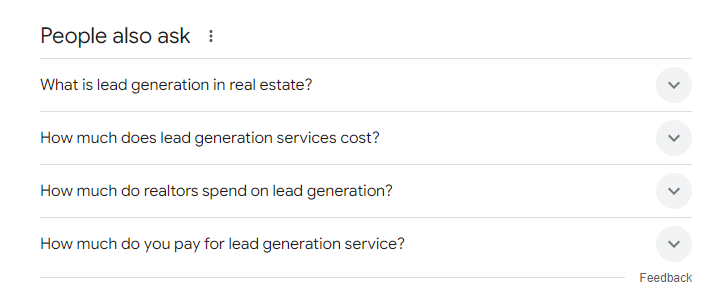
Lastly, some keywords appear at the end of the page labeled as “People also search for”. Here is what it looks like for the same keyword.

It’s true that you will again have to use the same strategy to find untapped opportunities, but when you use Google Search, you have a better chance of finding new keywords, especially in the “People also search for” section, as people often add fresh keywords there.
Leverage Google Search Console to Discover Emerging Keywords:
If you have an established business already leveraging SEO, you can gain an unfair advantage in finding emerging keywords related to your topics.
It makes sense that when a new search term appears, Google will provide searchers with some results. However, if the term is underserved or emerging, the results might not be fully accurate and will likely come from the top relevant websites.
If you rank for certain keywords as an authoritative website, you have a better chance of appearing for these new search terms. Consequently, this data will be available in your Google Search Console (GSC) account for that business.
By consistently analyzing your GSC, you can identify and tap into these opportunities. For instance, I discovered keywords related to Metaverse business opportunities using this same strategy, and I was the first to write about this topic.
Thus, Google Search Console can be an excellent tool for finding new, fresh, emerging, and underserved keywords.